Iulian Vlad Serban
Raising Student Completion Rates with Adaptive Curriculum and Contextual Bandits
Jul 28, 2022Abstract:We present an adaptive learning Intelligent Tutoring System, which uses model-based reinforcement learning in the form of contextual bandits to assign learning activities to students. The model is trained on the trajectories of thousands of students in order to maximize their exercise completion rates and continues to learn online, automatically adjusting itself to new activities. A randomized controlled trial with students shows that our model leads to superior completion rates and significantly improved student engagement when compared to other approaches. Our approach is fully-automated unlocking new opportunities for learning experience personalization.
Few-shot Question Generation for Personalized Feedback in Intelligent Tutoring Systems
Jun 08, 2022



Abstract:Existing work on generating hints in Intelligent Tutoring Systems (ITS) focuses mostly on manual and non-personalized feedback. In this work, we explore automatically generated questions as personalized feedback in an ITS. Our personalized feedback can pinpoint correct and incorrect or missing phrases in student answers as well as guide them towards correct answer by asking a question in natural language. Our approach combines cause-effect analysis to break down student answers using text similarity-based NLP Transformer models to identify correct and incorrect or missing parts. We train a few-shot Neural Question Generation and Question Re-ranking models to show questions addressing components missing in the student answers which steers students towards the correct answer. Our model vastly outperforms both simple and strong baselines in terms of student learning gains by 45% and 23% respectively when tested in a real dialogue-based ITS. Finally, we show that our personalized corrective feedback system has the potential to improve Generative Question Answering systems.
A New Era: Intelligent Tutoring Systems Will Transform Online Learning for Millions
Mar 03, 2022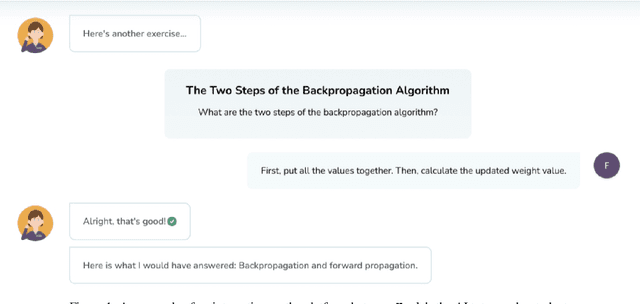
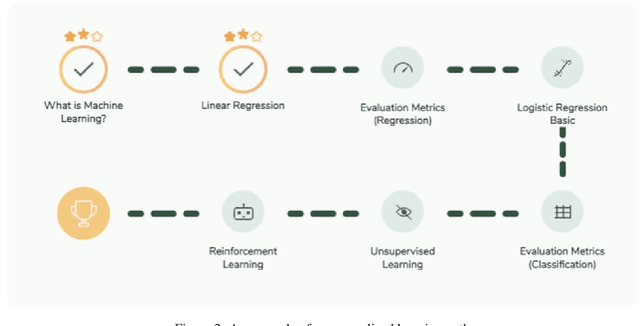
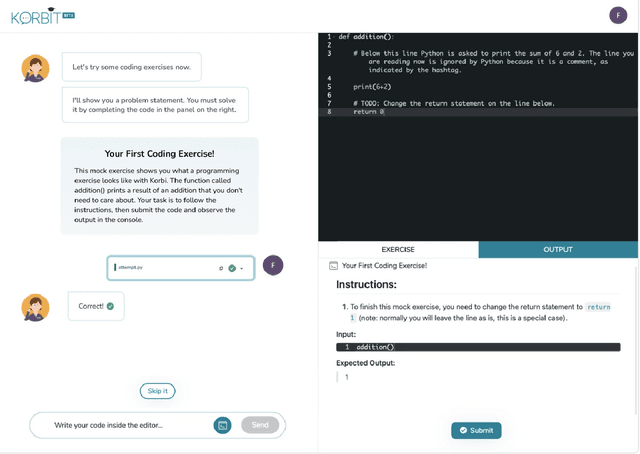
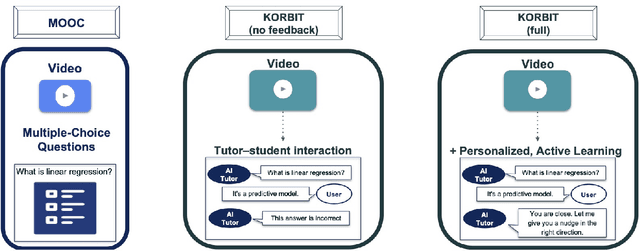
Abstract:Despite artificial intelligence (AI) having transformed major aspects of our society, less than a fraction of its potential has been explored, let alone deployed, for education. AI-powered learning can provide millions of learners with a highly personalized, active and practical learning experience, which is key to successful learning. This is especially relevant in the context of online learning platforms. In this paper, we present the results of a comparative head-to-head study on learning outcomes for two popular online learning platforms (n=199 participants): A MOOC platform following a traditional model delivering content using lecture videos and multiple-choice quizzes, and the Korbit learning platform providing a highly personalized, active and practical learning experience. We observe a huge and statistically significant increase in the learning outcomes, with students on the Korbit platform providing full feedback resulting in higher course completion rates and achieving learning gains 2 to 2.5 times higher than both students on the MOOC platform and students in a control group who don't receive personalized feedback on the Korbit platform. The results demonstrate the tremendous impact that can be achieved with a personalized, active learning AI-powered system. Making this technology and learning experience available to millions of learners around the world will represent a significant leap forward towards the democratization of education.
Back-Training excels Self-Training at Unsupervised Domain Adaptation of Question Generation and Passage Retrieval
Apr 18, 2021



Abstract:In this paper, we propose a new domain adaptation method called $\textit{back-training}$, a superior alternative to self-training. While self-training results in synthetic training data of the form quality inputs aligned with noisy outputs, back-training results in noisy inputs aligned with quality outputs. Our experimental results on unsupervised domain adaptation of question generation and passage retrieval models from $\textit{Natural Questions}$ domain to the machine learning domain show that back-training outperforms self-training by a large margin: 9.3 BLEU-1 points on generation, and 7.9 accuracy points on top-1 retrieval. We release $\textit{MLQuestions}$, a domain-adaptation dataset for the machine learning domain containing 50K unaligned passages and 35K unaligned questions, and 3K aligned passage and question pairs. Our data and code are available at https://github.com/McGill-NLP/MLQuestions
Comparative Study of Learning Outcomes for Online Learning Platforms
Apr 15, 2021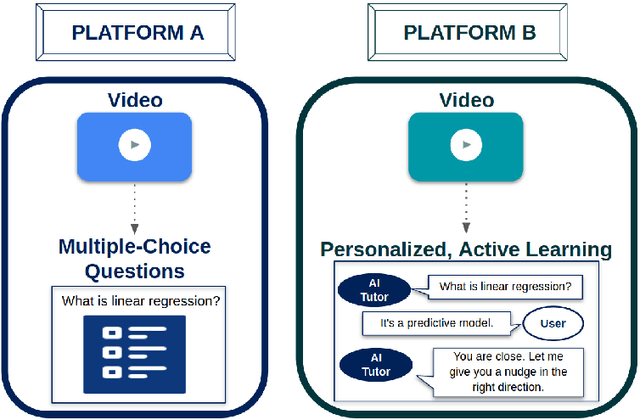

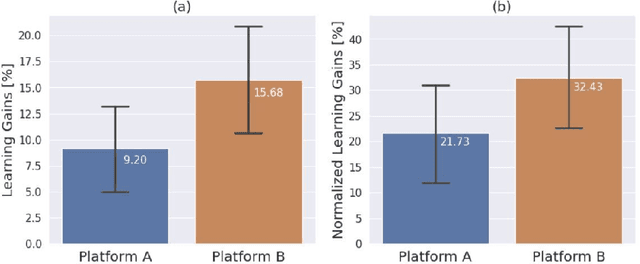
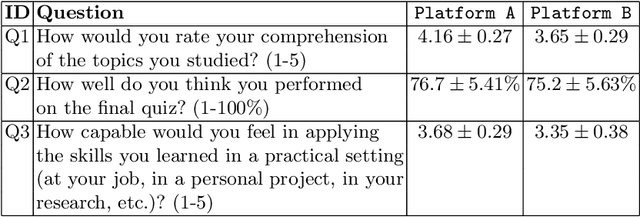
Abstract:Personalization and active learning are key aspects to successful learning. These aspects are important to address in intelligent educational applications, as they help systems to adapt and close the gap between students with varying abilities, which becomes increasingly important in the context of online and distance learning. We run a comparative head-to-head study of learning outcomes for two popular online learning platforms: Platform A, which follows a traditional model delivering content over a series of lecture videos and multiple-choice quizzes, and Platform B, which creates a personalized learning environment and provides problem-solving exercises and personalized feedback. We report on the results of our study using pre- and post-assessment quizzes with participants taking courses on an introductory data science topic on two platforms. We observe a statistically significant increase in the learning outcomes on Platform B, highlighting the impact of well-designed and well-engineered technology supporting active learning and problem-based learning in online education. Moreover, the results of the self-assessment questionnaire, where participants reported on perceived learning gains, suggest that participants using Platform B improve their metacognition.
Automated Personalized Feedback Improves Learning Gains in an Intelligent Tutoring System
May 07, 2020

Abstract:We investigate how automated, data-driven, personalized feedback in a large-scale intelligent tutoring system (ITS) improves student learning outcomes. We propose a machine learning approach to generate personalized feedback, which takes individual needs of students into account. We utilize state-of-the-art machine learning and natural language processing techniques to provide the students with personalized hints, Wikipedia-based explanations, and mathematical hints. Our model is used in Korbit, a large-scale dialogue-based ITS with thousands of students launched in 2019, and we demonstrate that the personalized feedback leads to considerable improvement in student learning outcomes and in the subjective evaluation of the feedback.
A Large-Scale, Open-Domain, Mixed-Interface Dialogue-Based ITS for STEM
May 06, 2020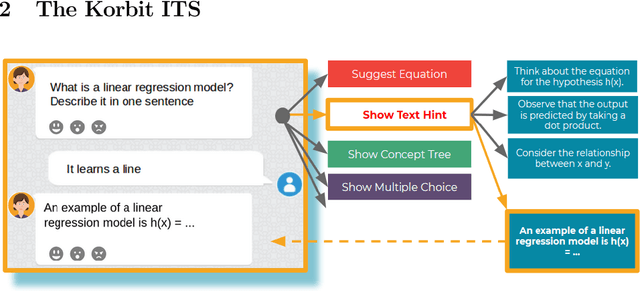
Abstract:We present Korbit, a large-scale, open-domain, mixed-interface, dialogue-based intelligent tutoring system (ITS). Korbit uses machine learning, natural language processing and reinforcement learning to provide interactive, personalized learning online. Korbit has been designed to easily scale to thousands of subjects, by automating, standardizing and simplifying the content creation process. Unlike other ITS, a teacher can develop new learning modules for Korbit in a matter of hours. To facilitate learning across a widerange of STEM subjects, Korbit uses a mixed-interface, which includes videos, interactive dialogue-based exercises, question-answering, conceptual diagrams, mathematical exercises and gamification elements. Korbit has been built to scale to millions of students, by utilizing a state-of-the-art cloud-based micro-service architecture. Korbit launched its first course in 2019 on machine learning, and since then over 7,000 students have enrolled. Although Korbit was designed to be open-domain and highly scalable, A/B testing experiments with real-world students demonstrate that both student learning outcomes and student motivation are substantially improved compared to typical online courses.
The Bottleneck Simulator: A Model-based Deep Reinforcement Learning Approach
Jul 12, 2018



Abstract:Deep reinforcement learning has recently shown many impressive successes. However, one major obstacle towards applying such methods to real-world problems is their lack of data-efficiency. To this end, we propose the Bottleneck Simulator: a model-based reinforcement learning method which combines a learned, factorized transition model of the environment with rollout simulations to learn an effective policy from few examples. The learned transition model employs an abstract, discrete (bottleneck) state, which increases sample efficiency by reducing the number of model parameters and by exploiting structural properties of the environment. We provide a mathematical analysis of the Bottleneck Simulator in terms of fixed points of the learned policy, which reveals how performance is affected by four distinct sources of error: an error related to the abstract space structure, an error related to the transition model estimation variance, an error related to the transition model estimation bias, and an error related to the transition model class bias. Finally, we evaluate the Bottleneck Simulator on two natural language processing tasks: a text adventure game and a real-world, complex dialogue response selection task. On both tasks, the Bottleneck Simulator yields excellent performance beating competing approaches.
A Survey of Available Corpora for Building Data-Driven Dialogue Systems
Mar 21, 2017
Abstract:During the past decade, several areas of speech and language understanding have witnessed substantial breakthroughs from the use of data-driven models. In the area of dialogue systems, the trend is less obvious, and most practical systems are still built through significant engineering and expert knowledge. Nevertheless, several recent results suggest that data-driven approaches are feasible and quite promising. To facilitate research in this area, we have carried out a wide survey of publicly available datasets suitable for data-driven learning of dialogue systems. We discuss important characteristics of these datasets, how they can be used to learn diverse dialogue strategies, and their other potential uses. We also examine methods for transfer learning between datasets and the use of external knowledge. Finally, we discuss appropriate choice of evaluation metrics for the learning objective.
Generative Deep Neural Networks for Dialogue: A Short Review
Nov 18, 2016



Abstract:Researchers have recently started investigating deep neural networks for dialogue applications. In particular, generative sequence-to-sequence (Seq2Seq) models have shown promising results for unstructured tasks, such as word-level dialogue response generation. The hope is that such models will be able to leverage massive amounts of data to learn meaningful natural language representations and response generation strategies, while requiring a minimum amount of domain knowledge and hand-crafting. An important challenge is to develop models that can effectively incorporate dialogue context and generate meaningful and diverse responses. In support of this goal, we review recently proposed models based on generative encoder-decoder neural network architectures, and show that these models have better ability to incorporate long-term dialogue history, to model uncertainty and ambiguity in dialogue, and to generate responses with high-level compositional structure.
 Add to Chrome
Add to Chrome Add to Firefox
Add to Firefox Add to Edge
Add to Edge